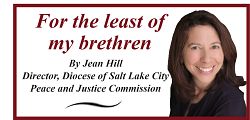Prepare to Vote By Forming Your Conscience
Midterm ballots will soon be coming to a mailbox near you, making these next several weeks the perfect time to form our Catholic conscience for voting consistent with our faith.
The United States Conference of Catholic Bishops’ teaching document Forming Conscience for Faithful Citizenship provides an important guide for Catholic voters. Consistent with Catholic teaching, the document does not ignore our ability to make voting decisions by telling us for whom we should vote. Rather, it walks us through a process of faithful discernment so we can make our own choices. (The document is available in English and Spanish at https://www.usccb.org/offices/justice-peace-human-development/forming-consciences-faithful-citizenship)
As Faithful Citizenship attests, engaging in political life from our faith perspective offers us an opportunity to live our Eucharistic call to “share the Gospel with your lives.” Bringing our faith into the public square may help us transform political parties, and guard us from being transformed by a particular party, through our focus on “the dignity of every human being, the pursuit of the common good, and the protection of the weak and the vulnerable” – a focus neither political party maintains consistently.
Unfortunately, far fewer voters exercise their right to vote during mid-term elections than in general elections. The lack of big races in mid-term elections is usually the primary excuse, but local races for county officials, legislative seats and school boards matter even more to our daily lives than the frenzy of presidential elections may lead us to believe. For example, presidents really don’t have much to do with the day-to-day in our schools – those decisions depend on state and district school boards and state legislators. Similarly, presidents don’t make decisions regarding how easy it is to exercise voting rights; county elections officials and legislators hold that authority.
For Catholic voters, decisions such as these have moral aspects that reflect our teaching on the rights and responsibilities of human beings, our ability to participate in our communities, the rights of marginalized communities and people living in poverty, and our moral obligation to vote, as described in our doctrine. The Catechism of the Catholic Church is clear: “It is necessary that all participate, each according to his position and role, in promoting the common good. This obligation is inherent in the dignity of the human person. . .. As far as possible citizens should take an active part in public life” (CCC 1913-1915).
We can also be thankful that voting in Utah is easy. Ballots show up at our homes weeks before the final voting deadline, granting us time to research the candidates and make well-informed decisions that reflect our faith. Of course, the choices we must make in voting will not be easy, since no candidate fully embraces the areas of focus described above, but unlike so many others globally, we are not forced into making decisions against our will or without access to ample information about our candidates. Squandering our vote when we have such amazing opportunities to serve as a voice for the voiceless should be utterly unthinkable.
Thus, it is time to get out our trusty copies of Forming Conscience for Faithful Citizenship (it can be downloaded, printed or purchase a hard copy at the USCCB site) and spend some quality time determining for whom and how we will vote this upcoming election season.
Voting is a right in the United States, a moral obligation in Catholic teaching, and one method readily available to us to make positive change for the common good. Register to vote, read Faithful Citizenship, and exercise your Catholic voice in support of the common good.
Jean Hill is director of the Diocese of Salt Lake City Office of Life, Justice and Peace. Reach her at jean.hill@dioslc.org.
© Copyright 2025 The Diocese of Salt Lake City. All rights reserved.


Stay Connected With Us